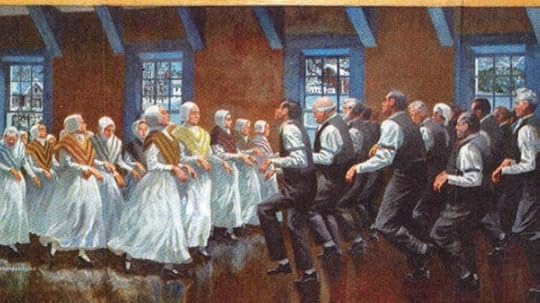Jude Knight's Blog, page 77
September 27, 2019
Religions and revival in Georgian England

Shakers worshipped in dance
I’ve been reading up about dissenters, pantheists, cults, and other non-traditional religionists in the 18th and early 19th century. In religion, as in society as a whole, it was a time of ferment. New ideas and new ways of doing things led to (and came out of) the industrial revolution, the French and American revolutions, revolutions in the approaches to scientific inquiry, artistic expression, fashion, farming, architecture, and all kinds of other aspects of human society. How people worshipped was part of, and in part fuelled, that change.
Some writers make the direct link. It was those driven from France into the Lowlands after the Edict of Nantes (Lutherans, Catholics, Jews, and members of other persecuted sects) that, thrown together in exile, began to question conventional social mores.
Their heretical opinions about orthodox Christianity led some of them into the extremes of Puritanism, and others to deny all labels. ” I am not Lutheran, Calvinist, Arminian, Socinian, Anabaptist, or Quaker,” says book factor, Prosper Marchand, one of the voices in that place and time. He avowed a Christianity with no organised church and no official doctrine, and this in 1712. From such radical thinking, itself fuelled by Renaissance humanism, came the Enlightenment, as well as Hellfire clubs, messianic cults, poetic pantheism, and the Great Awakening, with its new forms of established religion such as Methodism. These, in time, led to the reform of those institutions that had triggered the change.
Millenialism was a strong strain in the American Revolution. Victory over the British showed that God favoured America, and those with millenialist leanings became convinced that it was in the United States that Christ would reign for 1000 years. Even the French revolution had religious roots, with the diaspora mentioned above strongly shaping the politics of the revolutionaries. Some argue that the industrial revolution, likewise, was a consequence of religious thinking.
Religions influenced by dualistic philosophies view the material world with suspicion and hostility. The material world is considered evil, while the spiritual world is considered good and noble. Renouncing this world became the mark of holiness. Equally detrimental to the development of science were world views that did not have a concept of a supreme personal Creator God. Some of the ancient civilizations, for example, which did develop some mathematics and technologies, did not develop general scientific theories, because of the absence of a creationist perspective that gives confidence in the existence of rational laws in nature. This clearly explains the lack of interest on the part of these cultures in scientific research and technology. It also shows how the Reformation, with its return to Biblical Christianity, spurred a phenomenal interest in fundamental research and technology. The great scientific advances and the industrial revolution that followed bear this out. (Institute for Christian Research)
The abolition of slavery, wide-spread education, broadening of the suffrage, workers rights — all of these 19th century innovations were championed by those who inherited the Great Awakening; that is, by the intellectual and spiritual children of those religious exiles.
In my book The Darkness Within, my hero’s investigation into a disappearance leads him into a pantheist cult.







September 24, 2019
Secondary Characters on WIP Wednesday

I tend to have quite a cast of secondary characters, and to fall in love with them and want to know more. Other characters manage to be far more disciplined. How about you? Are your supporting cast just there to provide an ear (or a knife) at the appropriate time? Or do they insist on developing personalities and threatening to take over?
Give me an excerpt with a secondary character! I’ll show you one of mine. This is the Earl of Hythe in conversation with his older sister, the heroine of To Wed a Proper Lady. Hythe has a mania for tidiness which Sophia uses in this scene.
As soon as Sophia entered the house, Pinchbeck said, “Lord Hythe has arrived, my lady, and asks that you attend him in his study as soon as you return.”
“Very well,” Sophia agreed. “Tell my brother that I will be with him shortly. I will just go up to my room to wash.” London’s air and its filthy streets always left her feeling grimy.
The butler shuffled, but did not remove himself from her path. “Urgently, my lady, his lordship said.” His tone was apologetic, but uncompromising.
Sophia wondered what could possibly be so urgent. Hythe was not usually so peremptory. She handed her maid her bonnet, gloves, and pelisse. “Very well. Theodosia, take these up to my room, please, and begin to prepare for my next change. Lay out the green dinner gown with the deep flounce.”
The butler was leaving, his message delivered. “Pinchbeck, order tea and refreshments to Hythe’s study, please. Also, a bowl of hot water, soap, wash cloth, and towel. If Hythe wishes me to come to him directly, then he can watch my ablutions.”
“Yes, my lady.”
Sophia knocked and opened the door, catching Hythe with his boots on his desk, leaning back in his chair with his eyes shut. He swung his legs down and stood. “Sophia. Good. I wanted to talk to you.”
“So I understood from Pinchbeck. Immediately, he said. Without an opportunity to wash or tidy my hair.”
Hythe flushed. “I did not demand that you come as soon as you walked in the door. Old Pinchy exceeds his commission.”
“He misunderstood, then.” Sophia rolled her sleeves back, ready for her wash. “I was certain, my dear, that you would not be so discourteous.”
“Of course not.” Hythe was blushing still more, his eyes turned away from his sister’s scandalously exposed arms. “I only told him I wished to speak to you as soon as possible. When you returned, I said.”
“I collect that you told him it was urgent. You may be pleased, Hythe, that your butler is so eager to obey you.” While inconveniencing and potentially offending the woman who had been mistress of this house in the ten years since her mother died. The servants saw as clearly as Sophia did that her reign would end when Hythe took a wife.
“It can wait if you wish to…”
Hythe trailed off when a footman came in with a bowl of water, followed by Sophia’s maid Theodosia, carrying a towel, wash cloth, and soap.
“Not at all, Hythe. I have taken the liberty of sending for what I required.”
She sat on the sofa, and gestured to the footman to put the bowl on the table in front of her. Hythe, who hated anything out of order, looked at the arrangement with horror. To distract him, she asked Hythe, “Have you had a pleasant trip?” They conversed while she swiftly washed her face and then her hands. He had been to their estate in Sussex — to escape the social round, as she well knew, though he had clearly used the time to good effect, as he shared with her the decisions he’d made with his land steward while he was there.
Another pair of maids arrived with the tea service and a tray of tidbits. Sophia nodded to the footman to remove the bowl, and Theodosia took the towel Sophia handed her and wiped the table with it before the others put down their trays in front of Sophia.
Hythe paled at the misuse of the towel. Poor Hythe. It had been unkind of her to show her pique at his order by disrupting his study in this way.







September 22, 2019
Disastrous error!

Go on. Ask me. Which part of ‘never do stuff while you’re tired and distracted’ didn’t I follow?
I’ve just accidentally cancelled the pre-order of Unkept Promises on Amazon. I knew straight away that my fingers had just betrayed me, but it was too late. No ‘are you sure’. Just gone. Locked. Can’t get in. And the ominous message in my email inbox:
Dear KDP author,
The pre-order for your book Unkept Promises has been canceled. Customers have been notified that it was canceled because you have decided not to publish your book. Also, you have lost pre-order access for one year.
For more details about Pre-orders, check out this page.
Best Regards,
Kindle Direct Publishing Team
I’ve sent a tearful begging message to Kindle Direct Publishing. Can I recover from this disaster? Meanwhile, the ads are going out, and the book isn’t.
And my preorders! All the people who expect the book in less than 36 hours! And the reviewers who are waiting to jump in. I feel sick. I might just go and crawl into a hole and pull a blanket over my head.







September 19, 2019
Let’s hang out at the mall

The second royal exchange
Did you know that the first English mall was opened in 1571? Merchant Thomas Gresham, who lived in Antwerp, followed the Bourse shopping exchange in Antwerp as his model. The idea was an arcaded building housing small shops, surrounding a small courtyard for trading. With royal approval from Elizabeth 1, the mall soon became a magnet for merchants and shoppers. Idlers, too, much like the malls of today.
In the Inquest Book of Cornhill Ward, 1574 (says Mr. Burgon), there is a presentment against the Exchange, because on Sundays and holidays great numbers of boys, children, and “young rogues,” meet there, and shout and holloa, so that honest citizens cannot quietly walk there for their recreation, and the parishioners of St. Bartholomew could not hear the sermon. In 1590 we find certain women prosecuted for selling apples and oranges at the Exchange gate in Cornhill, and “amusing themselves in cursing and swearing, to the great annoyance and grief of the inhabitants and passers-by.” In 1592 a tavern-keeper, who had vaults under the Exchange, was fined for allowing tippling, and for broiling herrings, sprats, and bacon, to the vexation of worshipful merchants resorting to the Exchange. In 1602 we find that oranges and lemons were allowed to be sold at the gates and passages of the Exchange. In 1622 complaint was made of the rat-catchers, and sellers of dogs, birds, plants, &c., who hung about the south gate of the Bourse, especially at exchange time. It was also seriously complained of that the bear-wards, Shakespeare’s noisy neighbours in Southwark, before special bull or bear baitings, used to parade before the Exchange, generally in business hours, and there make proclamation of their entertainments, which caused tumult, and drew together mobs. It was usual on these occasions to have a monkey riding on the bear’s back, and several discordant minstrels fiddling, to give additional publicity to the coming festival. (https://www.british-history.ac.uk/old...)
The Royal Exchange is still on the same site today, though the buildings have twice been destroyed by fire and rebuilt.
After the Great Fire of London, the place was built in nearly a rectangular quadrangle. The philosopher Joseph Addison says:
“There is no place in the town,” says that rambling philosopher, Addison, “which I so much love to frequent as the Royal Exchange. It gives me a secret satisfaction, and in some measure gratifies my vanity, as I am an Englishman, to see so rich an assembly of countrymen and foreigners consulting together upon the private business of mankind, and making this metropolis a kind of emporium for the whole earth. I must confess I look upon High ‘Change to be a great council in which all considerable nations have their representatives. Factors in the trading world are what ambassadors are in the politic world; they negociate affairs, conclude treaties, and maintain a good correspondence between those wealthy societies of men that are divided from one another by seas and oceans, or live on the different extremities of a continent. I have often been pleased to hear disputes adjusted between an inhabitant of Japan and an alderman of London; or to see a subject of the great Mogul entering into a league with one of the Czar of Muscovy. I am infinitely delighted in mixing with these several ministers of commerce, as they are distinguished by their different walks and different languages. Sometimes I am jostled among a body of Armenians; sometimes I am lost in a crowd of Jews; and sometimes make one in a group of Dutchmen. I am a Dane, Swede, or Frenchman at different times; or rather, fancy myself like the old philosopher, who, upon being asked what countryman he was, replied that he was a citizen of the world.”
This was the Royal Exchange of the Regency. The outside shops were lottery offices, newspaper offices, watchmakers, notaries, stock-brokers, and so on. The shops in the galleries were superseded by the Royal Exchange Assurance Offices, Lloyd’s Coffee-house, the Merchant Seamen’s Offices, the Gresham Lecture Room, and the Lord Mayor’s Court Offic, with its row of offices, divided by glazed partitions, the name of each attorney on a projecting board. The vaults were let to bankers, and to the East India Company. They stored pepper there.
This building burned down in 1838. Today’s building has the layout of the original — a trapezoid-shaped building , with rooms all around the outside on the ground floor that let on to a wide internal corridor open to a central courtyard. The upper level is also given over to rooms and corridors.

The Royal Exchange today







September 17, 2019
Attraction on WIP Wednesday

If our story includes a romance, it includes attraction. (Sometimes, it includes attraction even without a romance!) This week, I’m sharing another bit from The Gingerbread Caper, and I’d love for you to share an extract of yours in the comments.
She joined him at the table. “It’s our quiet time, and I was about to stop for a cup of tea myself.” She offered him a plate with pieces of gingerbread cookie and a slightly flattened cupcake. “Milk?”
“A little bit, please and no sugar.” Her physical impact wasn’t lessened by her proximity. He’d been imagining a middle-aged, perhaps even an elderly woman. Someone with white curly hair, comfortably rounded, grandmotherly. Someone he could look at without wanting to fall at her feet, his tongue hanging out.
“You’re Patrick Finch, aren’t you?” she asked, and when he assured her that he was indeed, she opened her eyes very wide, her eyebrows shooting up. “I thought you would be much older.” She tossed ahead, clucking her tongue. “I said that out loud, didn’t I?”
“Ms Fotheringham–” Patrick began. She interrupted him. “You had better call me Meg.”
He said his own name, managing to manipulate the aforementioned tongue into the familiar syllables. The question he had been about to ask had to drained from his brain, and receded still further when those lovely eyes — brown with flecks of green — stayed focused on him, a question in their depths.
Before he could compose himself sufficiently to continue, she saved him the trouble. “I should explain that I am not my aunt.” She successfully interpreted the rapid blink with which she greeted this mystifying statement. “My Aunt Margaret owns this bakery and the flats upstairs. She was called away quite unexpectedly, and I am looking after the place for her. There wasn’t time to let you know, and I don’t suppose it makes a difference anyway, as far as you are concerned. In a minute I will show you your flat and leave you to get settled. As Aunt Margaret told you, your meals will be served down here in the tea rooms. Your rent includes all three meals, and morning and afternoon tea.”
Patrick sat there nodding, when what he really wanted to do was shake his head. This was a disaster. He had been sent out of town to convalesce — his doctor and his manager both insisting that if he stayed home he would not be able to resist working. Absolutely no stress, the doctor had said. He had been looking forward to a little mothering from the comfortable elderly lady he had expected. Instead, he was confronted by the finest example he had ever seen of that section of humanity that tied his tongue in knots and turned his feet into weapons of self-destruction.
A young woman. A lovely young woman. “I would like to lie down now,” he told her. His errant imagination, functioning with far greater facility than the rest of him, immediately presented a picture of Meg waiting for him in bed. Scarlet sheets set off her lovely complexion.
“Of course.” The real Meg stood immediately. “Aunt said you have been ill, and it is a long trip from Wellington. What do you do there, Patrick?”
“Senior policy analyst,” he said, shortly. She opened her eyes, wide. “Who for? What do you do?”
“It doesn’t matter.” It wasn’t a secret, but his head was both pounding and attempting to drift around the room. She must have sensed his need, because she dropped the questioning.
“Come this way. Here! Let me take one of those.” She picked up the heaviest of his two suitcases and led the way.
Patrick stumbled after her with the second suitcase, hoping his blush would be gone before she looked at him again, or at the very least she did not guess the thoughts that so embarrassed him. Lust is perfectly normal, he assured himself. As long as you don’t dwell on it or insult the young woman, all shall be well. You have several good books. You can go for long walks.
A door at the front of the shop gave on to a small hall and a bank of stairs. Meg led the way up, which put her jeans-clad behind directly at Patrick’s eyelevel.
I wonder if she has a boyfriend? He shook his head. Of course she does. A woman like this? Don’t be more of an idiot than you can help, Patrick.







September 15, 2019
Published, in progress and planned books, mapped by series and connection

The image above shows my published books (black), those I’m currently writing (blue) and those I intend to write soon (red). If it’s shorter than a novel, I’ve put (novella) or (short story). A yellow container holds a series, with connected stories (those that are not part of the series but that include characters who’ve appeared in the series) out to the side and connected by a line. I have also marked my five mobile characters with a penciled line and the character’s names in green.
The plan is to complete The Darkness Within, then finish The Children of the Mountain King series before I start anything else. That’s about 300,000 words to write, so maybe ten month’s work. Since I like to publish a Redepenning book a year, I’m hoping it’ll be quicker. I’m looking forward to writing The Flavour of Our Deeds, next in The Golden Redepennings. Lucas Mogg, Kitty’s amour and Rede’s gamekeeper, is hiding a secret. I’m dying to tell you what it is, but we’ll all have to wait.







September 13, 2019
Vimy Ridge: Canada’s coming-of-age

Last April, I posted about the 102nd anniversary of the Battle of Vimy Ridge on History Imagined. It was a well planned, brilliantly executed operation in which all four divisions of the Canadian Corps, fighting together for the first time, successfully dislodged Germans from the top of a high ridge, a feat the French and English had failed to accomplish earlier in the war. It cost 3,595 Canadian deaths and approximately 7,000 wounded.
I will repeat most of that post here. Vimy Ridge in many ways represents to Canada, what Gallipoli does to Australia and New Zealand. Brigadier-General Arthur Edward Ross has been quoted as saying, “in those few minutes I witnessed the birth of a nation.” As Gallipoli defines the moment in which Australian and New Zealand came of age as independent countries, so Vimy Ridge took on mythological importance to Canadians. They came out from the shadow of Britain.
Weeks of training and nighttime drilling made use of models and mock-ups to prepare the troops for the attack. Unlike tactics employed at the Somme the year before, effort was made to empower leadership down to the squad level so every man knew that if officers fell, the assault would continue. Units were given as much information as possible, to decentralize command and to encourage initiative.

They built roads and railways, shored up the French trenches, made use of existing underground caverns called souterrains dug into the chalky soil, and built an additional 6km of subways to transport troops as close to the front as possible while protected from German Fire.
More important than any other innovation and preparation, however, were the overwhelming amount of artillery brought up to support the attack and improvements that enabled artillery shells to explode on contact so few simply burrowed into the mud. Steady bombardment began March 20 and lasted twenty days, raining death and destruction onto the top of the ridge. On April 3 it intensified, and Germans called it “the week of suffering.”
Coincidentally that week was holy week; Good Friday must have been hellish for men on both sides. My own interest is rarely about strategy and planning, but primarily about the men themselves, the lives of the common soldier, hiding in tunnels, trenches, and caves waiting. When the time came the stories of individual heroism at Vimy Ridge abounded. The names of Ellis Sifton, William Milne, and Jeremiah Jones, stand out as examples. Ordered to take Vimy Ridge, take it they did.
Shortly after dawn on Easter Monday, 9 April 1917, 15,000 Canadian troops, joined by a British division in their right flank, began their assault uphill in driving sleet, supported by still more artillery fire in a “creeping barrage” designed to protect them, and keep the Germans in their trenches. By the end of April 9 Canadians held the entire ridge with the exception of one hill; they pushed the Germans back 5Km, the greatest one-day advance in the war to that point. The artillery had been less effectively employed against Hill 145 (aka “the Pimple”). Defenders cut the Fourth Canadian Division to pieces in the initial assault. Renewed bombardment and a second infantry assault took the hill on April 12.

In the grand scheme of the Great War, Vimy Ridge could be defined as a mere tactical victory, its importance overshadowed by the British Army’s failure to make significant progress in the overall Battle of Arras of which it was a part, and the failure of the French action at Aisne, which it was designed to support. In the quagmire that was the war in northern France, Vimy cost the Germans an important vantage point, but only a few kilometers of ground.
Strategically vital? No. Defining? Emphatically yes. Though joined by a British division, and other the overall command of Sir Julian Byng, architect of the meticulous planning, at the end of the day Canadian soldiers accomplished the thing. Men from every part of Canada charged up Vimy Ridge, functioning as a single unit. They had good reason to be proud of their daring, initiative, and success.
They were not finished. There were battles of greater strategic importance, and more bloodshed still to come—Amiens, Cambrai, Passchendaele, and Ypres. Yet it is Vimy that is remembered as the corps’ defining moment. It is therefore fitting that Canada’s main monument to the Great War in France is the Vimy Memorial, which sits atop Hill 145.

Caroline Warfield, award winning author of historical romance usually set in the Regency and Victorian eras, reckons she is on at least her third act, happily working in an office surrounded by windows where she lets her characters lead her to adventures. She nudges them to explore the riskiest territory of all, the human heart, believing love is worth the risk.
Her most recent release is Christmas Hope, set in France during World War I, it includes scenes at Vimy Ridge.

After two years at war Harry ran out of metaphors for death, synonyms for brown, and images of darkness. When he encounters the floating islands of Amiens and life in the form a widow and her little son, hope ensnares him. When the Great War is over, will their love be enough?








September 10, 2019
Scandal and gossip on WIP Wednesday

I’ve made the final changes to Unkept Promises and am in the process of generating the files to upload to the retailers. So this is my last work-in-progress extract from the book, and this time, I’m thinking about that perennial driver of Regency and Victorian romance, gossip. In my excerpt from Chapter 2, we find that gossip was the force behind Mia’s and Jules’s marriage.
How about your stories? Has gossip been a motivating factor? Share an excerpt in the comments.
“Tell me about the rumours,” Jules commanded.
The three gathered around his bed. Susan fussed over helping him to sit then left the room so the men could see to his comfort. She returned to say she had sent for breakfast. “Just a coddled egg and some thinly cut slices of bread, Jules. Nothing to inflame your fever again.”
“Tell me,” Jules repeated.
“Eat first,” Father suggested, “and get a little of your strength back.”
From what he’d heard, Jules would need it.
The egg and bread came with a few mushrooms, some bacon, and a cup of warmed milk flavoured with honey and spices. Jules rejected the drink and demanded some of the coffee that had been fetched for the other three. “Now tell me what they are saying about Mia,” he demanded. “Surely people realise the circumstances? She was trapped with me, yes, but her father was there too, and she is, after all, just a girl.”
“Gossip,” Aldridge said. “Rumour paints her as your lover, of course, but worse is being said.” He held up a hand. “Not my servants. They know how to be discrete. It seems a mix of village small-mindedness and a couple of females who should never have been invited to one of my parties. I am sorry. They shall be, too, but not soon enough to undo the damage.”
Jules turned to Susan. “How bad is it? She hoped to be able to return to her home.”
“She insisted on going,” Susan said. “It was not a happy experience. Apparently, the rumours had arrived first. Thank goodness I persuaded her to allow me to go with her. Her landlord has evicted her, and even the woman who runs the local dame school…”
“She believed the gossip?” Mia had spoken so highly of the woman.
Susan shook her head. “Not at all. But she depends on the money she receives from the parish and the wealthier parents.” She shrugged.
“It is the other two roles ascribed to her that have done the damage,” Aldridge explained. “Mutually conflicting, but when was the mob ever rational?”
One story said she was a member of the smugglers’ gang (and whore to one or more of those ruffians). “She fell in love with your pretty blue eyes and killed several of the smugglers, including her lover, to free you,” Aldridge explained. “The number of people she killed in order to get you out of your cell grows with each repetition of the story. The latest round has her father cast as the smugglers’ secret leader, and accuses her of parricide.”
Jules and his sister snorted in disgust, and the marquis quirked one corner of his mouth in a twisted smile. “People are idiots,” he agreed.
“The other story has her providing entertainment at Aldridge’s party,” Susan added. “Some have to invent a whole new messenger to tell Aldridge about the smugglers, and some knit the two stories together to say she sold herself to Aldridge in return for help to rescue you. Either way, she purportedly accompanied the Marquis to the rescue, on his horse, semi-clad.”
“Partly true,” Aldridge conceded. “Not the semi-clad bit, obviously, but she did come on my horse.” At identical glares from Lord Henry and Jules, he held up defensive hands. “She would not take no for an answer, and I certainly couldn’t leave her at the castle until my guests had departed. Not those guests.”
“Jules,” Father said gravely, leaving the point, “her father appears to have been her only family. She has been left near destitute and with her reputation in ruins. But she refuses the remedy that would save her.”
“I heard,” Jules said. “Marriage to me. Because of Kirana.” He met his father’s gaze, his own solemn. “Kirana and I have two children, Father, if all went well with her lying in. I cannot desert them. My life is in Madras. I am posted to the Far East fleet, and should have been on my way back days ago. In addition, Mia is a child—just fourteen. Her peculiar upbringing has made her mature in many ways. Even so, she is not ready for marriage.”
“Mia is…” Susan began, but Father waved her to silence, leaving Jules to finish his own arguments for and against.
He was thinking about what his life might look like with Mia as his wife. He could think of worse fates. As Aldridge had implied, she would be a magnificent woman when she grew up. “Can I leave her with you? If I marry her… Would you take her in as a daughter and look after her until I come home?” Which could be years from now, and anything could happen. He was going back into the war. He might die. Any of them might.
Yes. He would marry Mia and let the future look after itself.







September 9, 2019
Tea with a willing deputy

Today’s post is an sneak preview of the novella I’m writing for the Belle’s next anthology, due out in February. Matilda is Her Grace’s ward.
Matilda had apprenticed to her guardian at enough major events to be able to write lists of the possible problems with ideas on how to solve them, and by early afternoon, she was satisfied that, whatever the weather did, they could cope.
She visited the duchess again, and this time was invited inside. Her Grace was dressed, but lying propped up on pillows on a sofa in her sitting room, her eye swollen nearly shut by a large purple bruise. Reassured that Matilda was fully recovered, she claimed that she, too, was on the mend.
“I shall be perfectly well by the auction and ball, my dear,” she insisted, “but I know you will all fret if I get up too quickly. Indeed, I am still a little shaken, so I shall rest, and you shall be my deputy and run my messages.”
“Of course, Aunt Eleanor,” Matilda agreed, and explained what she had been doing. By the time she had displayed her list, the duchess had paled and was drooping on her pillows.
“Tell me what is most urgent for me to know,” Matilda said, “then I shall go away and let you rest.”
“Nothing, Matilda. You are doing an excellent job. Give me a kiss, my dear, and off you go.”







September 7, 2019
You can’t please all of the people all of the time

Following on from last week’s discussion about the different ways of writing a historical romance, and particularly a Regency, the other morning I got two emails, one after the other, both about Unkept Promises. Unkept Promises is a different take on a historical romance – set mostly in Cape Town with a couple seven years married who haven’t seen one another since the wedding day. Set in Regency times against the background of the long war with Napoleon, it’s not so much a Regency as a storyabout two people drawn to one another despite their reservations, and about the importance of family.
The first said:
I am honored that you would consider me for an ARC of your upcoming release. But unfortunately, I won’t be reading this book – I do not read books with unfaithful heroes/heroines – I was completely hooked until I read the “dying mistress and children” – I am not naïve, I know men had mistresses and it seems like their marriage was never consummated and some might absolve him from breaking his vows based on that – but I am not in that number – that behavior is not something I want to read in my fictional romances.
The second was a review of the same book.
I admire Jude Knight’s rebellious author streak, for her novels are never run–of-the-mill plots. Unkept Promises is no exception, in which Mia and Jules’ encounter one another in the strangest of circumstances.
Whilst events unfold that lead to marriage, Mia is far from ignorant to Jules’ former life and the subsequent responsibilities he has elsewhere. Although their marriage is not unusual for the period, the circumstances of it require gentlemanly retreat in honour of her young years. In some respects Jules is a reluctant hero, though is most definitely a man of his period in history and has borne no guilt in acquisition of a mistress. After all, he is a bachelor when he meets Mia, and as a British naval officer in the years of the Napoleonic Wars he is well travelled. Nonetheless Jules unfailingly bears responsibility for all that his cohabiting with a mistress has entailed. Thus a long gap ensues from Jules sailing out of British waters 1805 to 1812, when Mia now all grown up takes ship to Cape Town (South Africa).
Initially her discovery is disheartening, and sadness prevails within his home, and most of all anger boils over and she takes command of the household. Upon on his return from sea hidden truths gradually emerge and soften her heart toward him. Strong minded she is and ultimately determined to make of the marriage she entered into with sense of due purpose. Even when things go awry back in England Mia’s stoicism and love wins through despite frightening and deadly experiences that threaten both her and Jules very existence, neither knowing if the other is safe and alive. As always a thoroughly enthralling read from Jude.
I write historical fiction with a large helping of romance, a dash of Regency, and a twist of suspense. Read me if you enjoy determined heroines and decent heroes, a story with a braid of plots that take unexpected twists and turns, and loads of characters. I don’t deliberately defy ‘The Rules’, but I don’t follow them, either. All I promise is that eventually we’ll get to the happy ending.










